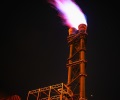Qatar’s LNG production to expand in coming years

Qatar’s Liquified Natural Gas (LNG) capacity forecasts a vital expansion in the coming years, a report by Fitch Solutions stated.
The country’s condensate production capacity is anticipated to grow gradually in the next four years from its present level as it keeps increasing its LNG productivity. Numerous LNG projects in the region have boosted the production capacity by partnering with QatarEnergy and its partners including Eni, ConocoPhillips, ExxonMobil, Shell, and TotalEnergies, and are developing NFE LNG projects.
The report said “The startup of the Barzan gas project in 2020 added 30,000 barrels per day to Qatar’s production capacity. Qatar is expected to produce approximately 260,000b/d of condensate from North Field East (NFE) and 120,000b/d from North Field South (NFS) LNG projects.” By 2027, condensate exports are expected to overtake Asian condensate splitters significantly expand their capacity and increase their ability to absorb incremental supplies. “Asia remains a strong magnet for condensate supplies from diverse regions, given its extensive condensate processing, refining, and petrochemical industries.
Asia is home to approximately 2 million barrels per day of condensate splitting capacity, with more than 35 percent of capacity located in South Korea, followed by China with 15 percent and Thailand with 14 percent respectively,” it said.
However, with current progress, Qatar is on track to be one of the largest condensate exporting hubs in the continent.
With increased production of LNG in the region, the market is expected for a surplus supply.Many other countries apart from Qatar are also in the race to be one of the largest condensate exporting countries including Iran, Australia, and the US supplied to the Asian region, which enables the market to bolster its productivity.
The report said that the “Potential influx of Qatari condensates to Asian markets after 2025 will generate implications on Asian markets contributing to near-term weakness in condensate and naphtha pricing.” “Condensate supply glut may drive prices downwards benefiting buyers, but suppliers should be hoping supply-demand balance to re-establish itself,” it added.
Source: The Peninsula

 Hellenic Shipping News Worldwide Hellenic Shipping News Worldwide, Online Daily Newspaper on Hellenic and International Shipping
Hellenic Shipping News Worldwide Hellenic Shipping News Worldwide, Online Daily Newspaper on Hellenic and International Shipping





















 PG-Software
PG-Software